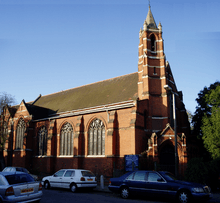St Benet Fink Church, Tottenham
St Benet Fink, Tottenham, is an Anglican church in Tottenham, London.[1]
| St Benet Fink | |
|---|---|
| Parish Church of St Benet Fink | |
 | |
 St Benet Fink | |
| 51.5973744°N 0.0910583°W | |
| OS grid reference | TQ3290 |
| Country | |
| Denomination | Church of England |
| Churchmanship | Traditional Catholic |
| Website | www.stbenetfink.org.uk |
| History | |
| Status | Church |
| Founded | June 3, 1911 - but see note below |
| Dedication | Saint Benedict |
| Consecrated | 1912-05-15 |
| Architecture | |
| Functional status | Active |
| Architectural type | Mini-Cathedral |
| Groundbreaking | 1911-06-03 |
| Specifications | |
| Length | 41 metres (135 ft) |
| Width | 18 metres (59 ft) |
| Nave width | 11 metres (36 ft) |
| Number of spires | One |
| Materials | Red brick walls, slate roof. |
| Administration | |
| Parish | St. Benet Fink, Tottenham |
| Deanery | East Haringey |
| Archdeaconry | Hampstead |
| Episcopal area | Edmonton |
| Diocese | London |
| Province | Canterbury |
| Clergy | |
| Vicar(s) | Fr James Hill SSC CMP |
| Laity | |
| Organist(s) | Ian Bednall |
History
Early history
The original St Benet Fink church was in Threadneedle Street in the City of London and is first mentioned in 1216.[1] At an unknown prior date a Saint Benedict's Church had been rebuilt with a gift from one Robert Finke.[1]
Name
Benet is short for Benedict from Saint Benedict. Historically, if there was more than one church in an area dedicated to a particular Saint then the benefactor's name was added to the churches name, hence Benet Fink.[1]
20th century
In 1904, a mission to this district was established and a Tin Tabernacle opened in Granger Road, dedicated to St Luke, in 1905, while funds were raised to build a permanent building. The current church was built during 1911 and 1912, and at its consecration on 15 May 1912, the Bishop of London referred to it as ‘the little Cathedral’; given its light and airy interior, reminiscent of Gothic cathedral architecture, it is easy to see why. The architect was J. S. Alder, and St Benet's is said to be his most complete and unaltered church. The spire houses a single bell, as was common architectural practice at the beginning of the last century; the building has a grade II listing. The symbols in the windows are the symbols of the saints and martyrs of Christian antiquity.[2]
Architecture
The church is of red brick with a slate roof and has a small spire that accommodates a single bell. It is the style that was common in north London at the beginning of the twentieth century. The site includes a matching vicarage and church hall.
Incumbents
| Vicar | |
|---|---|
| 1912-1917 | Fr Harold Van Cooten |
| 1917-1927 | Fr Marcus Donavon |
| 1927-1962 | Fr Charles Waton |
| 1962-1969 | Fr William Stephenson |
| 1969-2009 | Fr Michael Davenport |
| Priest in Charge | |
| 2010-2011 | Fr Mark Elliott Smith |
| 2011-2016 | Fr James Hill |
| Vicar | |
| 2016 | Fr James Hill |
Reference:.[1]
References
- Leaflet published by the church for its annual open day 2010-07-10
- "History of St Benet Fink". Retrieved 9 November 2012.